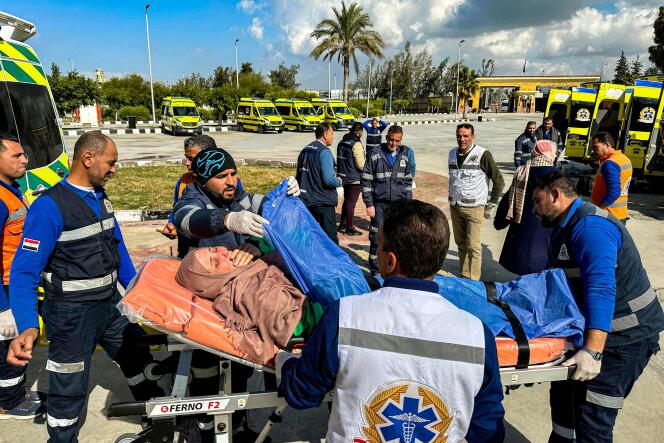


With an incessant humming, three Israeli drones patrolled the skies. The aircraft flew over the town of Rafah, on the Palestinian side, almost directly over the border separating the Gaza Strip from Egypt. Abderrahman Zarb, an 18-year-old Palestinian, stood in front of the large gate with an Egyptian flag over it and is framed by imposing concrete walls. Looking up, he watched the "zennena" drones flying above, named after the buzzing of bees in the Palestinian Arabic dialect.
He lives in Egypt, but most of his family is from Gaza. On Sunday, February 4, carrying carts loaded with sacks of potatoes, trays of eggs and crates of oranges, he entered the Palestinian enclave to meet up with his relatives who have taken refuge in the camps for displaced persons on the other side of the border. He doesn't know when he'll be able to return.
A few hundred Gazans who found themselves in Egypt when the blast occurred on October 7, 2023, have crossed into the Gaza Strip to be closer to their families, although they risk remaining there. In the opposite direction, only holders of Egyptian or international passports are granted passage following an opaque validation process, or after they pay a high fee through an underworld network of intermediaries.
At a time when the Israeli army has announced that it is extending its operations in the south of the enclave where more than 1.5 million civilians are crowded together, all eyes are on this border crossing. The Rafah terminal is the only way out of Gaza's hell. But it is barely ajar, firmly controlled by the Egyptian authorities who refuse any exodus of Palestinians into their territory.
Nevertheless, Cairo has set up a protocol for accepting wounded individuals within its borders. From time to time, an ambulance rushes through the barrier. In dribs and drabs, the Egyptian Red Crescent successfully organized evacuations to various hospitals. With a capacity of 200 beds, the hospital at El-Arish, 55 kilometers to the west along the Mediterranean coast, is on the front line. Since November 1, 400 Gazans have been treated there. In all, Egypt has taken in more than 2,200 wounded Palestinians, according to the president, along with several hundred accompanying relatives.
Once out of the hell of Gaza, the nightmare doesn't disappate for these patients. Admitted to Egypt for medical reasons, their identity papers are often confiscated, and they are prevented from moving around the country unless there is a compelling reason for them to do so. While some are transferred to hospitals in Cairo, they are not allowed to leave without authorization, and can only speak to journalists under the close surveillance of Egyptian security services who are anxious to show solidarity with the Palestinians. Finally, the wounded are asked to return to El-Arish, which has become an obligatory destination, a hub.
You have 60% of this article left to read. The rest is for subscribers only.
